Voting Values
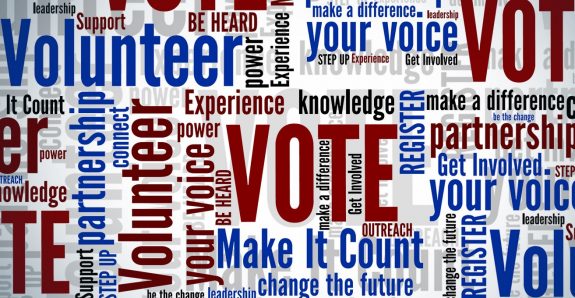
By John Haly
Voting is the expression of the rights of an individual to participate in their government, but like any expression, it can be misdirected, coerced, bought and sold. Political Parties understand the role and importance of marketing, propaganda and salesmanship in seeking your vote, irrespective of whether it is in your or your community’s best interest, or aligns with your values.
Value development
For the rest of us, our political attitudes are not always based on careful consideration of policy. Instead, a range of factors including gender, family, religion, race and ethnicity, and early childhood environments are strong predictors of political beliefs.
However, we arrive at our political beliefs; the next question we need to ask is, who in the political spectrum best represents those beliefs. This may be discovered by:
- an analysis of the policies and their consequences
- an evaluation of the perceived integrity of the political party
There is a range of political analysis strategies to make a systematic evaluation. Though this does presume that:
- Any of us spend any time to analyse the policies of political parties.
- Politicians can be trusted to follow through on their promises and ideological pronouncements.
- Politicians represent their constituents and not the interests of well-financed lobbyists and donors.
Instead of a rationally researched choice, research demonstrates that we engage in:
- Bandwagon voting [1] in which people’s voting preferences are reflecting a desire to follow trends and “hop on the bandwagon” regardless of the underlying evidence. [2]
- Reluctance to change voting patterns as other research from Europe demonstrates that voters do not adjust their perceptions according to what parties advocate in their campaigns. [3]
- A lack of comprehension of essential differences between the major parties motivated by the desire to decrease the potential costs of post-decision regrets. [4]
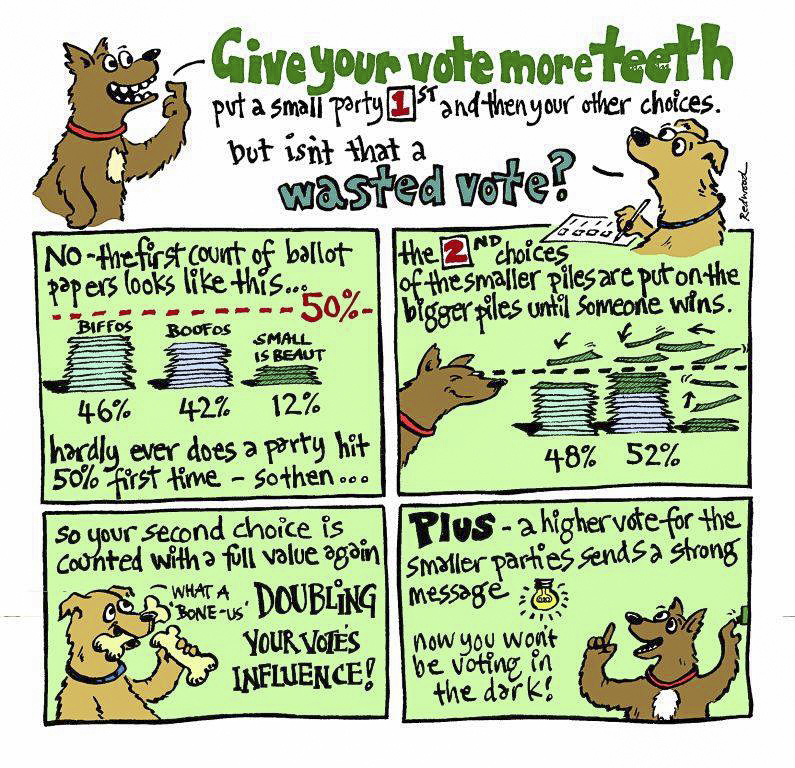
Why discouraging small party votes disempowers voter’s message.
Major political parties actively encourage bandwagon voting. A prime example is an argument that you should vote for a major party on the pretext that that is more likely to win, instead of voting for the minor party which holds policies with which you agree. This argument ensures you throw away your real choices, for a compromise with values you don’t own, for people you would rather not have in power and relinquish your one element of control to power brokers. I can only assume this must be very empowering for someone, just not the voter.
The reluctance to change your voting patterns despite disagreeing with what parties advocate is a common problem in every democracy. Pensioners expressing anger at being shafted by the government, then declaring their continuance to vote for the same party, may seem odd to an outsider, but we know it happens.
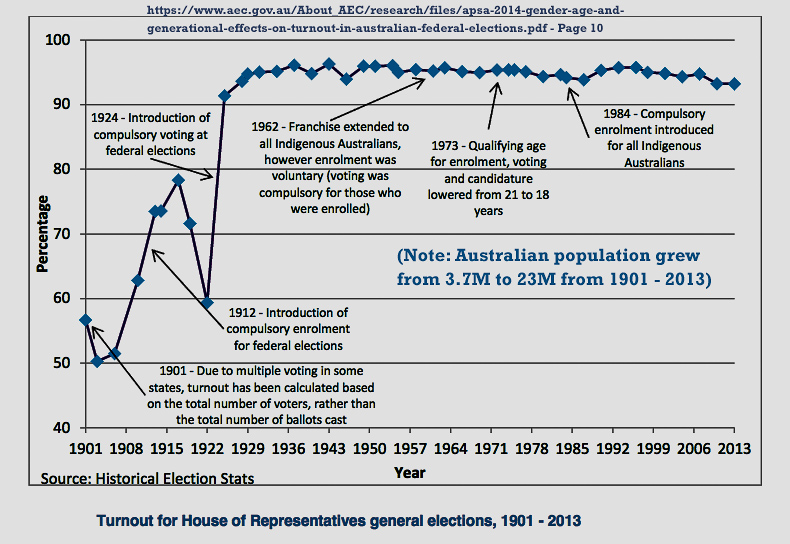
Turnout % failure increasing in real numbers in recent decades.
Failure to comprehend essential policy differences underpins the high incidence of informal voting in Australia of around 6%. The percentages of voter turnout failures and eligible voters not registering has also increased over time, although offset recently by the Marriage Equality plebiscite voter enrolments. Informal vote margins could have changed outcomes in electorates and possibly even the election of 2016. Many are content to throw away their only leverage in politics; protesting that we don’t like our options when we don’t know what our options are. These folk are highly disengaged with the ability to change politics but are very deliberate in expressing their political disappointment.
Left or Right
Other issues are the misperception of where your values lie on the spectrum between left and right wing, or “progressive” versus “tyrannical”. Some other people are sufficiently misled in concepts of political theory to associate socialism with the Nazis or can’t distinguish between communism, socialism, capitalism and democratic socialism.
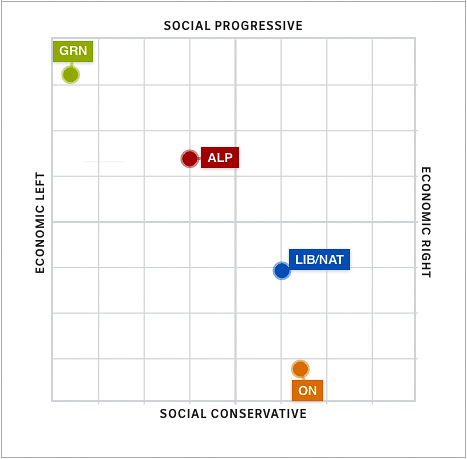
ABC’s insular perception of political positioning
To aid objective rationality researchers examine party policies, attempting to map a parties position on the political spectrum. The ABC’s vote compass tries to help voters understand their position relative to each of the main political parties. The ABC describes its online survey as a civic engagement application, where one can:
“Based on a user’s responses to a series of propositions that reflect salient aspects of the campaign discourse, Vote Compass calculates the alignment between the user’s personal views and the positions of the political parties.”
Its critics suggest it’s an insular Australia-centric representation of political ideology, treating the Labor Party as Left-wing party and the Liberals as Right-wing party. The Greens and One Nations are treated as political extremists. The basis of the perception is that it reflects community attitudes. There is an apparent political reluctance for the ABC – and the “political scientists” who designed the “compass”, – to challenge the status quo or adopt an international perspective.
Democratic Socialism or Nationalist conservatism
The Liberal Party in Australia sees themselves as conservative which former prime minister John Howard described as a “broad church”. The Labor party still see themselves as a left-wing “democratic socialist party”. Oddly both Labor and Liberal suffer from the delusion that they are progressive parties who are at odds with each other when they are really merely in heated agreement. Some pundits legitimately note there are left and right factions within both Parties, but the party as a whole, cannot be both. Both Labor and Liberal party candidates vote as a whole and discourage “crossing the floor“.
The party as defined by what its policies support, must by logical necessity, establish itself as either one or the other, independent of its internal divisions. As such, I am not interested in the individuals but the gestalt organisation. Also, I want to introduce a more global view of politics rather than the insular ABC Vote compass. A broader international perspective lifts us away from the tedious bias criticisms levelled at the ABC from both “sides” of the political spectrum.
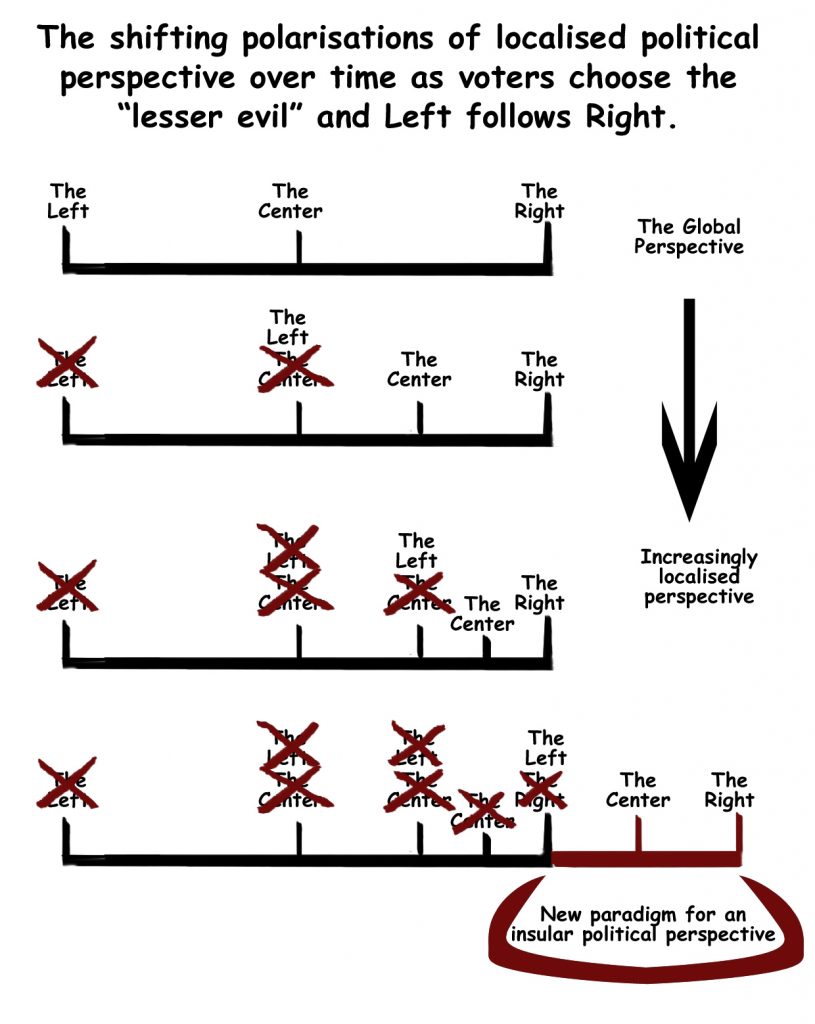
The shifting polarisations of localised political perspective over time.
How the world sees the political spectrum has changed since it was simplistically regarded as American capitalism versus the communist Soviet Union. This died with the Soviet Union’s restructure via Gorbachev’s policies of glasnost and perestroika. In the latter part of the 1980s, as the walls came down in Berlin, perspectives changed. The attitudes of Menzies’ worship in the 1980s that framed perspectives for political engagement, for men like Tony Abbott, Joe Hockey, and Christopher Pine at college, have shifted significantly.
The Global Compass
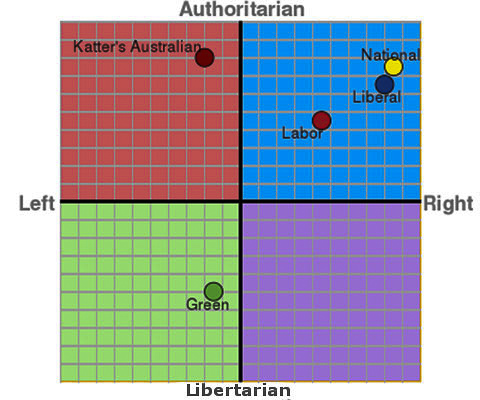
Political Compass positioning of Parties in 2016
The internet phenomenon of the political compass did not originate from the ABC but from further afield from an older body of political analysts, who review politics from an international perspective as opposed to our myopic national perception. “The Political Compass” has been analysing OECD democracies since 2001. Their perspective on the political positioning of Australian politics is very different and revealing. The political compass provides a much more accurate assessment of the exact nature of the political positioning of parties in the Australian democracy (and for that matter several other democracies such as the UK, Canada, America, Germany, New Zealand, Irish, and European Governments).
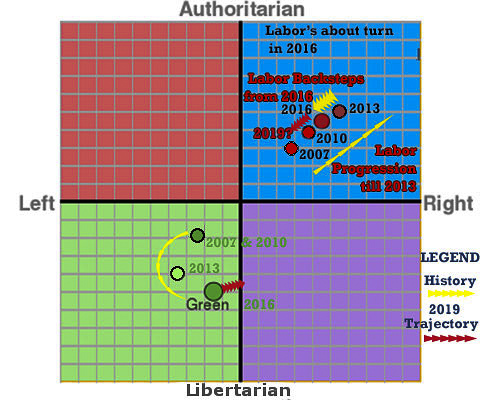
Previous Labor Party progression and direction change since 2016.
What is of particular interest to myself was to review their separately graphed analysis of each year to gain a perspective on how we have changed over time. To this end, I have overlaid the graphs from the last four elections as depicted by the analysis from https://www.politicalcompass.org/aus2007 to https://www.politicalcompass.org/aus2016. This show’s Labor as a right-wing authoritarian party that had been steadily marching further rightwards and more authoritarian until 2016 when it seems they took a back step.
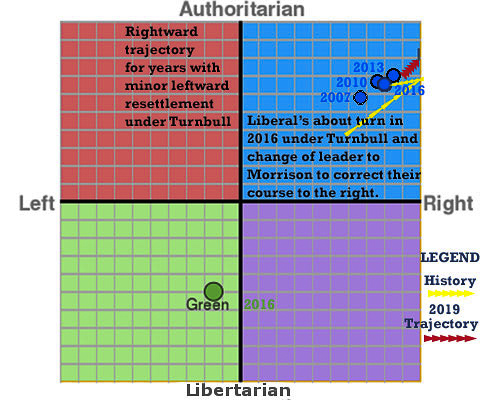
Liberal policy blip leftwards corrected under Morrison and back on course.
It has primarily followed behind the Liberal party, which, although always further right in political ideology at any instance in time, shifted towards the centre in 2016. While this shift helped the Liberals under Turnbull win the 2016 election, the Right-wing factions of the Liberal Party subsequently reasserted themselves. After a challenge by former immigration ministers Peter Dutton and Scott Morrison, the conservative Morrison claimed the Leadership of the party. The direction of the party reassumed the previous course to the Right.
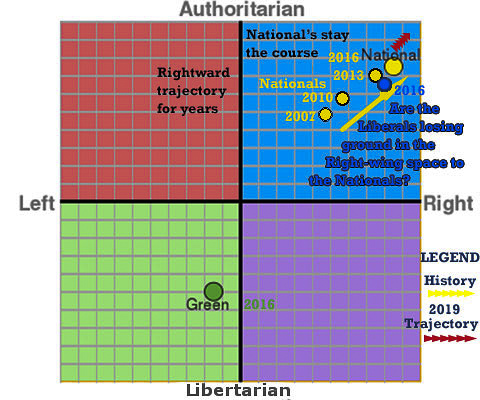
National Party being utterly consistent and never swerving from the path.
Interestingly, the only party that has made no backstep at all was the National Party. They have stopped for nobody including their partners in the Liberal Party. If you are a right-wing voter who expresses some concern that the Liberal party has softened, then the Nationals have compromised for nobody. Neither, for that matter, has Pauline Hanson’s One Nation party.
Menzies & Whitlam
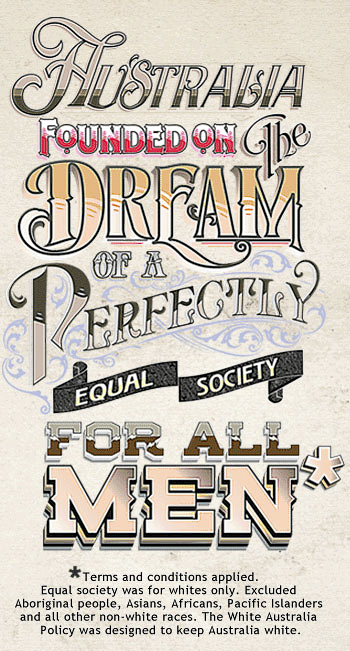
White Australia Policy – Racist & misogynist
From 1949 to 1966 Sir Robert Menzies dominated conservative politics as the Prime Minister. While described by contemporaries as the Father of the modern conservative movement he was far more pro-refugee, pro-family, pro-freedom, pro-middle-class as the “The Forgotten People” broadcasts showed, then the current manifestation of the Liberal Party. Despite his support for the racist White Australia policy (which is an attitude that has run consistently through his party for generations) his later dismantling the policy and ratification of the UN Refugee Convention was far more progressive than what is exhibited by his party today with their indefinite detention programs. The conservatives held power until 1972 when Australia reacted to a long run of conservative political leadership and voted Whitlam and his agenda into power. By 1973 Whitlam’s Government changed immigration laws to repudiate race as an issue. Gough Whitlam from 1972 to 1975 shifted the political face of the country sharply to the left-wing. From the perspective of where Australia had been, his policies seemed radical. Some suggest that in comparison with the world stage, Gough was predominately only playing catch-up with many more progressive countries that had already gone down the path Gough was following. He admitted this in his 1969 election policy speech in Sydney Town Hall about education. Though to many Australians, especially the Right-wing, it was radical politics. While “The Political Compass” has taken no stock or measure of what the Labor Party looked like then, I suspect given the history of the movement of the Labor party in the socioeconomic, political spectrum, and it would be fair to suggest it was legitimately a Left-wing party at that time. It has marched steadily rightwards in the decades that followed.
Strange bedfellows
The only significant left-wing parties in existence anymore according to “The Political Compass”, were the Democrats, Bob Katter’s party and the Greens. Sadly, Don Chip’s political ambitions to “keep the bastards honest”, has been mostly lost to history. Bob Katter – while initially a member of the National Party – formed his party in 2011 and remained as a member of Parliament – neither gaining or losing ground. The Greens party, on the other hand, shifted towards the centre where the Democrats once trod, even taking on board as members, former state party politicians from the Democrats.
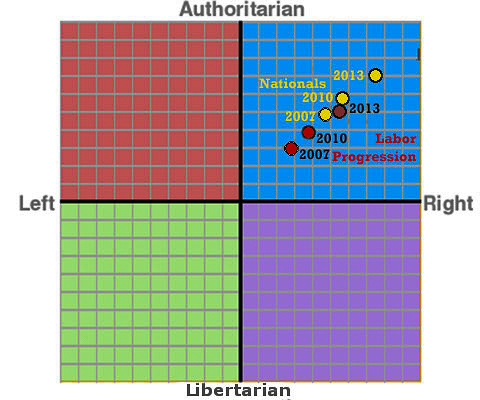
Labor catching up with the Nationals.
So regarding the left/right divides of the political spectrum, it is incorrect to think of it as between the ALP and the LNP. The real gap between left and right policies, ideologies, and social causes are primarily between the Greens on the left and the Labor/National/Liberal “coalition” on the right. Not of course, that the Liberals or Labor party would consider themselves in such an alliance, given their antipathy. In 2013 the political compass placed the Labor Party’s positioning under Kevin Rudd, to the right of the National party’s position in 2007 under Mark Vaile. Perhaps discovering the Labor party held a political policy position further to the right and closer toward authoritarian than the Liberal party’s partners (The Nationals) during the Howard years is undoubtedly challenging to some. While the conception of a Liberal/Labor coalition is unpalatable to both parties, keep in mind the Nationals under the Leadership of Barnaby Joyce had marched onwards unrelentingly rightwards and authoritarian and are no longer trailing behind the Liberal party the way Labor has done.
How far Right?
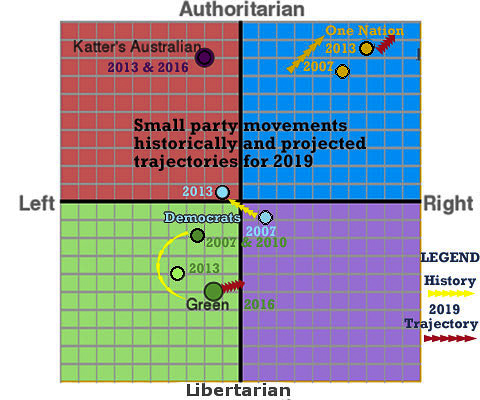
Small party movements and trajectories.
We should evaluate parties regarding their real and current political persuasions in the 21st-century rather than what they were in the 20th century under Menzies or Whitlam. The Labor “left” is no longer close to left-wing! If the rise of far-right nationalist movements from National Action in the 1980s, to Australia First, Pauline Hanson’s One Nation, Rise Up Australia (RUA), and the Australian Protectionist Party (APP), are any indicators, the two major parties are far more closely aligned. The political compass only charted One Nation in 2007 and 2013, but it is evident where on the spectrum it sits. In the absence of a re-evaluation for 2019, we must look to policy changes in parties to determine how far to the Right-wing sit Liberal, Nationals, One Nation and Labor. Given the bipartisan agreement around legislation and policies over initial Adani Coal mining support (although there are signs of change recently), refugee detention, Foreign interference, Encryption laws, journalists and whistle-blower repression, Social media laws restraints, Low targets for NEG energy , website blocking, the PM’s war powers, cutting migrant welfare, Aged care funding cuts, costly education, private healthcare, Metadata retention, globalisation of trade, mandatory sentencing agendas, static Newstart allowances, criminalisation of abuse reporting and privatisation of public assets, it is not hard to deduce the policy direction. While they have differences on minimum wage (only recently), marriage equality, climate change, Medicare, tax cuts, Federal ICAC, negative gearing and infrastructure & economy, remember that the Labor party has voted with the Liberals for at least 40% of all Liberal legislative agendas since 2013.
How Far Left?
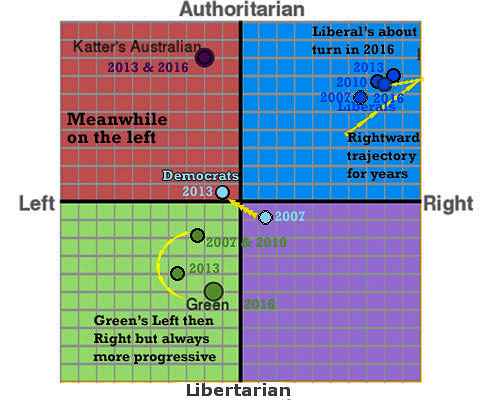
Greens and Liberals – just who are the “Neo-liberals on bikes”?
The only representative left-wing parties noted by the “The Political Compass”, were the Democrats, Bob Katter’s party and the Greens. The Democrats being the only real centrists to speak of had largely exited the realm of political influence but have returned to contest 2019’s election. The Green’s have floated around on the left side of the political spectrum becoming more Libertarian/Progressive over time but lately shifting rightwards. The Greens have been disparagingly referred to as “neoliberals on bikes”, but while it is true, they have as a party moved rightwards they are by the Political Compass’s assessment a long way from the Labor/Liberal/National neoliberal agendas. The Democrats and Greens are the closest to centrist parties Australia has.
Beyond these parties, the “Political Compass” has not assessed other left-wing or progressive smaller parties. These would include the Pirate Party, the Arts Party, Science Party, Socialist Alliance, and Reason Party, amongst others. The rise of small parties has been marked, and while the Political Compass does not evaluate them, recent emergents have been summarised in the embedded link here.
Choices
As 2019 election draws close, whatever values you seek in a party, left or right, socially conservative or progressive, it behoves you to consider which party aligns to your values. So perhaps it is time to reassess both your perception of where your party of choice stands in relation to what you believe. As such “The Political Compass” test, may be revelatory.
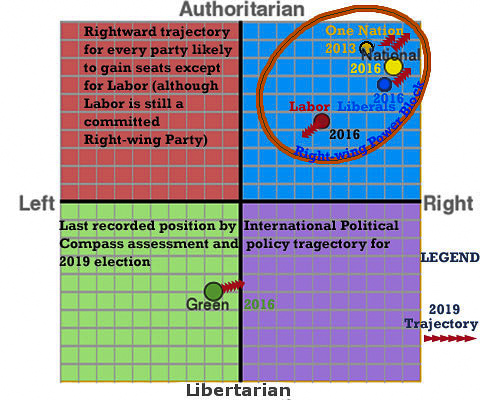
The right-wing power Block and what we can expect for 2019.
In doing so, perhaps you might adapt the fixed impression you’ve held over the past, for where the party you’ve always voted for, has moved to in the dynamic and ever-shifting landscape of Australian politics.
If you are a member of any number of right-wing nationalist parties such as “Rise Up”, “Australia First”, “Love Australia or Leave”, then your mainstream preferences would likely be extended to One Nation, the Nationals and the Liberal party in that order. If that is too far right-wing for your liking, but you are still conservative, then the Liberal Party followed by Labor makes a good choice. If you are what many refer to as a conservative “small l” liberal or a mild to a moderate right-wing constituent, then the Labor Party is the only option left to the right. Should in that process, you discover your leanings are significant enough to the left of the Labor/National/Liberal/One Nation right-wing power block, then you have three main options in Bob Katter, the Democrats and the Greens and numerous small progressive party options to choose from, depending on if they have representatives in your electorate.
To many realising that “Labor” is a right-wing party and “The Greens” are the only progressive centrist mainstream party is disturbing enough to one’s decision process, without having to evaluate the real position of smaller parties. The public’s expectations of democracy in Australia are damaged enough already.
What’s in it for …?
While there is inevitably, the hedonistic approach to politics, on which so many politicians count. All to garner your vote, with “What’s in it for me?”, as opposed to “What’s in it for my country?”! Might I remind you of the words of Gough Whitlam when writing in the London Daily Telegraph in October of 1989?
“The punters know that the horse named Morality rarely gets past the post, whereas the nag named Self-interest always runs a good race.”
Footnotes:
[1] Rebecca B. Morton, Daniel Muller, Lionel Page, Benno Torgler (2015) “Exit polls, turnout, and bandwagon voting: Evidence from a natural experiment”, European Economic Review, Volume 77, July 2015, Pages 65-81, Elsevier [https://www.sciencedirect.com/science/article/pii/S0014292115000483]
[2] David J. Lanoue and Shaun Bowler (1988), “Picking the Winners: Perceptions of Party Viability and Their Impact on Voting Behavior”, Social Science Quarterly Vol. 79, No. 2 (June 1998), pp. 361-377, [https://www.jstor.org/stable/42863794]
[3] Fernandez-Vazquez, P., & Somer-Topcu, Z. (2017). The Informational Role of Party Leader Changes on Voter Perceptions of Party Positions. British Journal of Political Science, 1-20. [https://doi.org/10.1017/S0007123417000047]
[4] Craig Goodman, Gregg R. Murray (2007), “Do You See What I See? Perceptions of Party Differences and Voting Behavior”, American Politics Research, Volume: 35 issue: 6, page(s): 905-931 [https://doi.org/10.1177/1532673X07303755]
This article was originally published on Australia Awaken – Ignite your Torches
Like what we do at The AIMN?
You’ll like it even more knowing that your donation will help us to keep up the good fight.
Chuck in a few bucks and see just how far it goes!
Your contribution to help with the running costs of this site will be gratefully accepted.
You can donate through PayPal or credit card via the button below, or donate via bank transfer: BSB: 062500; A/c no: 10495969










27 comments
Login here Register here-
Geoff Andrews -
wam -
Alan Nosworthy -
Zoltan Balint -
Think about your Vote -
totaram -
New England Cocky -
DrakeN -
Alcibiades -
DrakeN -
New England Cocky -
corvus boreus -
Paul Davis -
Kaye Lee -
John Haly -
Geoff Andrews -
wam -
corvus boreus -
Diannaart -
John Haly -
Diannaart -
Kaye Lee -
Diannaart -
Zathras -
Diannaart -
John Haly -
Diannaart
Return to home pageMaybe it’s time to reconsider the concept of compulsory voting.
A hard read and a bit worried by ‘center'(sic) but I am an americophobe.
Loved the reference to the nationals because the slimy green compass ignores the 3rd party in government. The abc follows suit with qanda ignoring the nationals and phon but includes another extreme minor party. Confirming that I have been wrong to deny the abc has a left bias. It has lurched to the right but this monday’s jones ego trip smells left?????
The point of labor being a right wing party ignores the current centre from which left and right is calculated. The greens and phon are extremists and still get the 10% of extremists. In ming’s day he supported immigrants because they were white and fleeing communist europe so were suckers for him and santamaria funny because pig iron bob was a WASP. Today both parties are WASC.
After reading the KAP manifesto prior to the last federal election my immediate impression was OMG Bobkat is a socialist. Totally useless on envoironmental matters but as someone needing the support of a fairly poor and under resourced rural and remote electorate whose landed gentry and townie businessmen are already captured by the LNP his shtick of being a rustic bushie unimpressed by city dictates resonates well.
His long term incumbency and ability to capture Labor preferences and even Green second preferences gives him the edge in numbers over the LNP and PHON as the lesser of evils.
With this election there is a lot more people saying they will not vote, can not be bothered. My observation is that those individuals are LNP voters that do not like what the LNP is selling but can not and will never vote for anyone else.
There is one factor not mentioned in this excellent article; Entitlement to election funding.
To quote the AEC website; “A candidate or Senate group is eligible for election funding if they obtain at least 4% of the formal first preference vote in the division or the state or territory they contested.” from https://www.aec.gov.au/Parties_and_Representatives/public_funding/index.htm
So what? This means that for each first preference vote parties or candidates will receive $2.75642 per eligible vote. This means you really do need to think about where you put your “1” !
As an example; in 2016 Pauline Hanson’s One Nation Party received $1,745,369.28 from the AEC, that is, taxpayers money. To see the full breakdown go to the AEC page “Final 2016 federal election payment to political parties and candidates” at https://www.aec.gov.au/media/media-releases/2016/08-17e.htm
I am glad to see this balanced analysis that shows that Labor is indeed neoliberal-lite, as many people have pointed out. Their problems with “national security” cause them to be authoritarian, and their fetish for budget surpluses does not allow them to be more progressive. Hopefully, the big surpluses projected in 3 year’s time, will go the way of the Swan surplus. Being based on the “treasury modelling” which makes various (often heroic) assumptions and ignores certain interactions, this is the most likely scenario. The famous 3-sector identity tells us that the surpluses are dependent on increasing private sector debt, or a foreign account surplus, both of which are unlikely events.
Sadly, Labor’s emphasis on “fiscal responsibility” could contract the economy and tip us into a recession, much to the joy of the tabloids and the coalition. A soon-enough increase to Newstart might work against that, but that is currently an unknown.
Thank you for an interesting article.
@Geoff Andrews: Do NOT toss out the present Australian preferential voting system that is slow to count and very difficult to corrupt.
Remember, first past the post voting gave Britain Margaret Thatcher, David Cameron, Brexit and Maggie May, the USA (United States of Apartheid) Ronald Regan, trickle down economics, Shrubya Bush and Trumpery.
You might research the NZ Haire-Clarke model because we have a lot to learn from the Kiwis apart from how to play Rugby.
NEC,
Are you actually referring to the Tasmanian “Hare-Clark” system?
Dump compulsory voting and the Coalition, or a Trumpian version of it, would likely win every election … and consequently re-introduce gerrymanders.
Labor = Neoliberal-Lite indeed. Though some interesting announcements have popped up these last few days … Multinationals, tax avoidance, tax havens, trusts … will the NIC have retrospective powers with real razor sharp teeth ?
Would have to destroy Murdochracy first though, lots of apparently co-ordinated signalling in that area too …
Muzzling the NewsCorpse effluvium is something which needs to be accomplished well before the following election.
Some kind of “Truth in Media” compulsion is desperately needed in this country.
@DrakeN: thank you for the correction.
wam (sigh).
I understand that you revel in any opportunity to elevate the status of One Nation and denigrate the Greens, but once again your statistical claims are a bunch of bias-blinkered bulldust.
Why are the Greens more frequently included in polling surveys and Q&A forums than the PHONs? (?????)
That would be because, nationally, the Greens have 9 senators and a HoR member, whilst PHON has only 2 senators, as well as the fact that the ‘loonies’ (!!!!!) routinely poll much higher than the far-right extremist fringe party that you obviously favour..
Hilarious guff on Our ABysmal’s Campaign Trail tonight with Trish Karvelas and her panel of Sam Maiden LNP cheerleader journalist and unsteady driver, Christine Forster LNP councillor and Abbots sister, John Anderson ex Country party fossil and Erik Locke former ALP advisor.
Anderson was particularly pathetic with his steady as she goes lets not rock the boat this is no time to go back to the days of Whitlamesque lunacy. Maiden was Maiden, lots of words no substance. Forster loyally and naturally gave Tony a good push as an outstanding member for his constituency. Locke was low key and polite, not pushing the Labor barrow too hard. Everyone agreed, as has been stated by comentators on this and other sites, that the LNP are conducting a one man presidential style election apparently believing that Scotty is their only asset. Allegedly one punter got set on a Labor win betting 1M @ $1.25 … go you good thing.
After watching the Laurel and Hardy routine today by serial treasurers bitch Mattias and the man who allegedly has his fingers on the financial pulse clueless Joshua, there appears to be nothing but lukewarm air being puffed out …. this balloon aint gunna fly. Did anyone else get the impression that Cormann was irritated and disappointed by his fiscal superior?
“Did anyone else get the impression that Cormann was irritated and disappointed by his fiscal superior?”
Yes I thought so too. And whoever told Josh that he should speak slower should be shot. He puts me to sleep.
Dear @Think about your Vote, the article is already quite long, and many folks will skim it and not read it correctly, much less look at the embedded links and appreciate all my research involved. If I had added “Entitlement to election funding” it would have been worthy of “The Monthly” or “Quarterly Essay”. There is always something in any article you can find wasn’t mentioned and as a journalist let me tell you word limits for articles required by most online media editors is the principal reason. I can’t get this published in IA because of that very reason. This article is “too bloody long”.
But yes, that is but another issue. Thank you for pointing it out. So select carefully who you want to choose as a small party that you want to support because they get paid. As an original member of the Arts Party (because they lobbied in support of Journalists and was started by a Journalist) when you vote for them, they get paid. That is the only lobbying for a party I am going to do, but as I said in the article, there are plenty of good progressive parties from which to choose.
“….the Pirate Party, the Arts Party, Science Party, Socialist Alliance, and Reason Party, amongst others.” (The embedded links were all to their policy pages so readers can evaluate for themselves.)
You don’t have to give money to Pauline. Choose another small party and help them out. Choose carefully and do your homework.
@wam – The comment “… ignores the current centre from which left and right is calculated” is a weird circular argument that returns to the ABC compass position that Labor by definition is Left, and Liberal is right, and the centre is the point in-between them. All of which means that your idea of the “centre” is in constant movement as both parties and their policies have changed radically over the decades. Or are you in denial of that? That the very ignorance that the entire article is dispelling. Did you read the article or just look at the pictures?
@Alcibiades – The subject of dodgy “Multinationals, tax avoidance, tax havens, trusts” has been around for a lot more than a few days but I assume you are speaking about something specific?
The last article I wrote here was on the NIC – https://theaimn.com/anti-corruption-models/ so you might find the modelling around what represents an effective NIC interesting. If you want to go into it in detail, have a look at my wife’s research paper which is referenced at the bottom of the article.
NEC,
I made no reference to preferential voting, which I believe is the better system. I was just putting the proposition that forcing people who may have no interest in (or intelligence of) politics, may constitute up to 10% of eligible voters. How many electorates have, say, a 5% margin.
caw caw the green search for cash at elections and phon does the same both have the candidates pay and take the AEC cash I just look at the numbers fairly
The nationals are easily the 3rd party with the loonie left and right extremists at the low end but the ABC gives the loonies and an unelected woman equal status with labor and liberals but no national and no phon, not just unfair but bloody ridiculous???
i am saddened by the hanson supporter on my pages for their unreasoned beliefs used to support her but to them they are real
I have a few green supporters but they are all asylum/refugee mixers who have their beliefs as truth.
Still you have a point statistics are for the use of but try and tell me that 10% is larger than phon in qld???
wam,
Note that last federal election, even in the One Nation heartland of QLD, although they outperformed the Greens (the only state in which they did), the preferred party of climate-change deniers and hoplophilic vaccinephobes still received less than 10% of the senate primary vote. In all other states contested they drew less than 5%.
If you have an ardent wish for an extremist fringe party (with it’s base mainly restricted to a single state), to get more airtime on our national broadcaster (in addition to the extensive promo time she/they already receive from the commercial networks), then that is your right, but do not expect anyone with any real interest in rational policy discussion or evidence based citations to share your outrage.
Ps, one question mark usually suffices.
People placing the Greens and PHON as natural opposites have never bothered to compare policies between the two parties.
One is a party with sincere concern for the future wellbeing of all Australians and its place in the world, the other is a clueless menagerie of often conflicting far right wet dreams, from loosening gun laws to dividing Australians into whites and nonwhites.
@Diannaart, sorry but you do understand that the political compass while not studying a number of small parties did assess One Nation and the Greens policies. One Nation they evaluated as very right-wing and Authoritarian/Conservative whereas the Greens were mildly left-wing and becoming more Libertarian/Progressive. Now the ABC Vote Compass did the same except that they considered it VERY left-wing which they only did because of how far the localised Overton window has slipped in the political assessment. In either case and accounting for Overton window movement, PHON and the Greens are somewhat opposite to one another. If people pace them as opposites than whether they assess policy or not, that is pretty accurate.
John Haly
I realised later, after posting my comment, that I wasn’t very clear and completely failed in expressing my point.
I meant that both the Greens and PHON have been presented as on the fringe; extreme left and extreme right respectively, opposites, by those wishing to claim the Greens are as looney as PHON.
While PHON is indeed a fringe group, I agree the Greens are, as you explained to me so helpfully😋, “mildly left-wing and becoming more Libertarian/Progressive”, particularly since Di Natale became leader.
I see Labor as right of centre and, consequently, the LNP is far right.
As you say the Overton window has shifted to the right so much that the old dichotomy of left/right no longer applies.
We need new descriptors.
🙂
Diannaart,
Or we could go back to old descriptors – fcking useless and the alternative. Let’s hope the alternative earns a title better than “the alternative”. They show potential. We shall see.
Comparing PHON to anything gives me a headache. I prefer to ignore them.
😀 I second “fcking useless” or “oxygen thieves” given the complete waste of time on climate mitigation and excuses made for doing fck all.
“Alternative”, yes, because “Progressive” will have to be earned.
As for PHON … in category of “do not discuss or even mention”, not worth it and only encourages them.
Nuff said.
There are two unavoidable things about voting in a democratic society –
Firstly, consider how ill-informed and ignorant the average voter is and then realise that half the population is even worse than that – and
Next – It only takes two morons to outvote a genius.
Otherwise it really comes down to a degree of chance with rusted-on supporters and the last-minute whims of a relatively small number of undecided voters.
The emerging danger is the growing number of disenfranchised and resentful voters who make their choice on the basis of some sort of media popularity contest or out of spite and give their vote to opportunistic independents.
Have just completed postal vote.
In my newly acquired (was LaTrobe last time I blinked) electorate of Casey there were more RWNJ’s than progressives to choose from for the HoR.
And, the Senate was a bit of a task, trying to place all of the worst of the RWNJ’s at the end.
All of the above is manageable with tablet beside me to check while I could take my time filling in my personal order of preferences.
But the average voter? At the polling booth?
As Zathras said, likely to be “ill-informed, ignorant” as well as highly unlikely to bother with the tedium of thinking about preferences for the HoR let alone the Senate. They will gladly use the how to vote cards most likely from either Labor or Libs. Should be noted both parties are hostile to a diverse cabinet of independents and strange small parties.
Link between complexity of voting and a Lib/Lab agreement to keep it complex, stupid?
Yes, I do want a Labor win, I also want a diverse representation to keep the bastards honest. But, doubt that is what I’ll get.
Just a thought.
@kaye Thank you, I laughed when I read the “f*cking useless” comment, as an alternative title/descriptors.
@Diannaart Yes, I understand your point now. Sorry I misconstrued your intent but phrases like “have been presented” are essential additions to such comments.
I understand the reluctance to “do not discuss or even mention” PHON which was my preferred option when writing the article but I realise that I do need as a journalist give an even-handed review to groups I consider personally unpalatable. Also by using them as an extreme view to counterpoint against, I can guide the reader on the fence to examine and re-evaluate why they may choose to vote for PHON. I don’t control who reads my material, and while this is a more progressively leaning media organisation, there is always folk who come to learn to understand alternative perspectives. Also on social media, I have encountered nobody who thinks PHON is not Right-wing although powerful sentiment against the view that Labor is Right-wing. Also that the Greens are on the left – marginally – but they have been moving towards a more centrist positioning. That is clear in the political compass’s modelling over successive elections. This is also not a popular view either. Yet if one looks at the increase in Greens voting with the Liberal government to which the Greens have capitulated. 8% under Abbott to 28% under Turnbull. Under Morrison, the parliament has hardly had a sitting day for anyone to pick up a meaningful pattern of data. (This data is from one of the embedded links in the article)
My wife wrote a penciled in a comment on my list of the legislative and senate choices I printed out – as part of my research as to how I was going to order my below the line choices – which said “Always hard to know who should come last”. That was a reflection on your observation that “there were more RWNJ’s” parties.
My preferred strategy is to Vote for small progressive parties and then vote for Greens then Labor, so the preference will end up with the larger party but the small party gets the AEC money, and you send a message to either the Greens and/or Labor to move leftwards. Far better strategy. A few progressive party suggestions would include “the Pirate Party, the Arts Party, Science Party, Socialist Alliance, and Reason Party, amongst others”. (to quote me) . 😋
@John Haly
We are on the same page entirely.
Have voted exactly as you intend, or have done.
We know that one of the majors, preferably Labor, will win, best then to vote for those who represent more closely with concerns – just one independent could make all the difference between an Adani coal mine or a welcome shift towards sustainability and reason. The arguments by many Labor supporters (mostly in QLD) that too many people will lose jobs is not based upon any clear eyed assessment of how many workers will be needed or the drop in tourism if further destruction of habitats, the GBR, water catchments occurs, as a result of mining a substance which will not hold any value in the next 5 years or less.
That the self proclaimed economic managers can’t or won’t see this … leaves me to face palm if not head bashing.
PS I’m the one who didn’t go to Journalism school, please forgive errors 😋